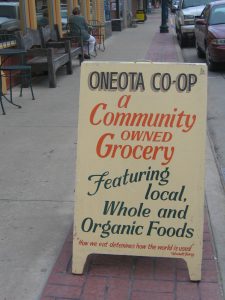Cooperatives can play a big role in small towns, providing products and services to fill gaps as well as giving local people a share of ownership.

Oneota Co-op Grocery. Decorah, Iowa. Photo CC by Jason Riedy
Rural cooperatives go way back
Rural areas have a long history with cooperatives through cooperative telephone service, electricity, and agriculture.
My husband is a member of the Alva Farmers Cooperative for farm supplies, and we’re members of Pioneer Telephone Cooperative for our cell phones and internet.
You might be a co-op member, too. Even so, you might not know much about how cooperatives work. Or how you could use one to make your town a better place to live. Or how they’re different from “community ownership.” You’ve probably seen the annual cooperative meeting notices and maybe even voted on board members or managers of a local cooperative. And while your cooperative patronage dividend check may not be enough to retire to the tropics, it does represent local money that stayed local.
What cooperatives are
When the people who buy the products or services also own and operate the business, that’s a cooperative. Or at least a start of one.
There are seven cooperative principles, adopted internationally in 1995, based on principles set out in 1844. (Yes, 1844.) Anyone can join, everyone has an equal say, everyone shares in the economic benefits, members get training to run the co-op, control stays local, co-operatives co-operate with each other, and the community benefits.
That certainly sounds more fair to your community than remote corporate ownership that has never seen your town, never heard of you, doesn’t care about your environment and isn’t particularly interested in much beyond profit.
When to consider a cooperative
When the owner retires.
When an owner retires instead of closing or selling the business, consider converting that business to a cooperative, especially a worker owned cooperative. You’ll cut down the possibility of an outside buyer later moving the company out of town.
When margins are thin.
Lots of small towns rely on community owned businesses to manage grocery stores, movie theaters, and other businesses important to the community that have thin margins. A cooperative makes a lot of sense to keep these businesses open.
When you want to share the benefits broadly.
Rather than benefiting just one founder, a small family group or a few wealthy investors, a cooperative distributes any gains to all the members.
Even a community-owned corporation means the one who owns the most shares has the most votes. A cooperative is one way to include everyone in both ownership and management.
When the community is at stake.
Essential services like utilities or health care may be too important to your community to hand over entirely to investor ownership. Or a key local business may matter too much to see it transferred or closed. In those cases, you can look at cooperative ownership as an alternative.
Cooperatives are still people
Since cooperatives are made up of people, there will be people problems. People will disagree, mistakes will happen, and personality conflicts will make life difficult.
“A co-operative is not a panacea,” Zita Cobb said. “It’s an organized way to fight with each other.”
Zita was speaking at the Georgetown Conference on Prince Edward Island, Canada. They used a co-operative to revive essential services for local fishers who faced enormous economic and environmental challenges.
Fighting with each other in an organized way is probably better than being at the mercy of corporations who put profit ahead of your local well-being. And it’s certainly better than corporations packing up profits every night and shipping them out of your community.
Learn more about cooperatives
The USA National Cooperative Business Association has a wonderful “What is a Co-op?” article with helpful infographics you can share in your community.
Co-operatives First helps people in Western Canada form cooperatives. Check out their blog full of articles on starting coops and revitalizing small towns. They are a good resource no matter where you live.
Australians can check out the Co-op Federation for helpful resources.
There’s also an International Cooperative Alliance.
Look for more local groups that are focused on your geography or the specific type of co-operatives you’re considering. The Federation of Southern Cooperatives/Land Assistance Fund is a cooperative association of Black farmers, landowners, and cooperatives in the southern United States.
Want to convert a small business to employee ownership? Becoming Employee Owned can help.
The USDA offers special services and support to cooperatives.
Is it co-op, cooperative or co-operative?
I was wondering, so I checked.
Internationally, it’s usually co-operative.
In the US, it’s usually cooperative.
Anywhere it’s shortened, it’s also usually hyphenated as co-op.










